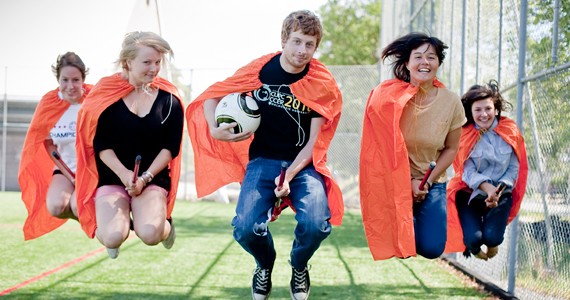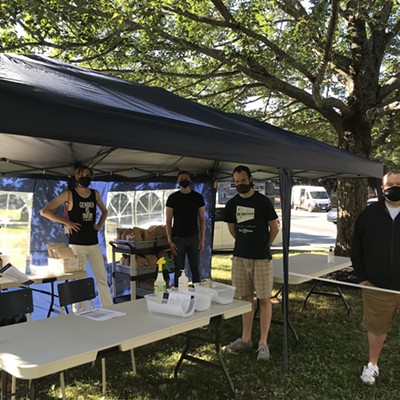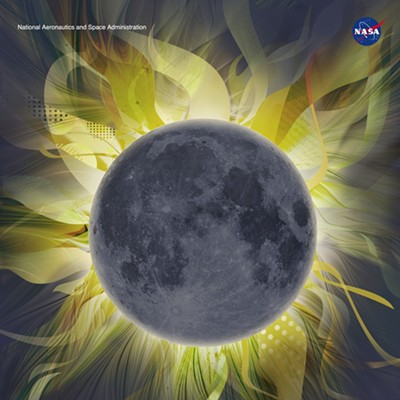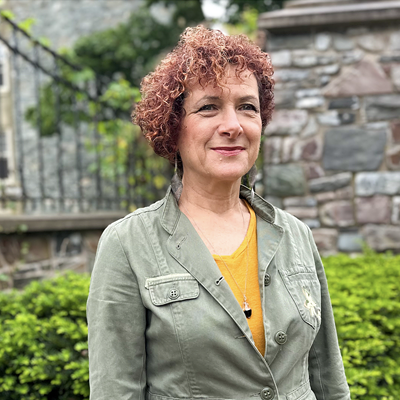Maybe you eagerly anticipated this summer's final Harry Potter movie because you're ready to sock the next person who uses words like "muggle" in daily life, or maybe you're actually stoked to see Harry vanquish Voldemort on the big screen. But one thing's for sure---Harry Potter fever has a stronghold in Halifax. Here's why.
Quidditch is a real sport in Halifax
YouTube it and you'll find a bizarre collection of videos featuring Dalhousie University students running around in different coloured capes with broomsticks between their legs, thrusting balls through a strange arrangement of hula hoops. Logan Astle, captain of The Chudley Canons, explains the allure.
"Feeling the wind blow through my cape just makes me feel so insanely happy," says Astle. "The most fun part about quidditch has got to be the initial rush you get when you are standing at opposite ends of the pitch, waiting to mount up and rush to centre field."
In case you don't know your bludger from your snitch, here's a quick Quidditch 101: It's a sport that involves riding around on broomsticks and attempting to toss a scoring ball through various hoops to get points. Players throw bludgers---in real life, they use dodgeballs---at their opposition to knock people off their broomsticks. The winning team has to capture a special golden ball called the snitch, which, of course, has a magical mind of its own and attempts to evade the players.
But in Halifax's muggle quidditch, the snitch is actually "a person dressed in yellow, with a tennis ball in a sock attached to his or her waist," who runs around until somebody catches him/her, explains Astle.
You're likely to catch a glimpse of the spectacle yourself if you haunt university campuses, as muggle quidditch is sweeping across our nation, hitting schools such as McGill. Astle says there have been a few quidditch tournaments so far---Dalhousie's One Moment society organized the first one as a fundraiser for AIDS relief, while others have been self-organized---and that he has no intention to stop playing quidditch.
"I know that my team and I are definitely interested in carrying on the tradition," he says, adding that he still has three quidditch brooms and a couple of capes waiting for him in storage.
Since the organization of these games is loose, interested participants should check in early October for signs around Dal, looking for those with scarves and broomsticks.
Adults still love playing pretend
If quidditch has peaked your love of pretending to be a wizard, but you're not keen to run around with a broomstick between your legs, you can join the Dalhousie Magic Society. Society leader Steve Foster explains that the society is for gamers who enjoy playing the collectible trading card game Magic the Gathering. The game, he explains, is based on fantasy: wizards engage in duels with one another to see who is the best, incorporating "a variety of creatures and spells."
The society is open to anyone, with 20 to 30 people showing up at weekly meetings and up to 75 people gathering at a time for bigger events, says Foster. He adds: "Every game is different and the game is quite addictive."
Learning about the paranormal is a serious business for some
If you'd like to take your passion for the paranormal to the next level, try studying it at university. If you're a sociology student, you can take "Goblins, Ghosts, Gods, Gurus" in second year at Dalhousie. Students study attitudes towards religion, magic and witchcraft and our conceptions of the supernatural. The course will also help students understand why people might decide to join groups that practice magic or witchcraft.
Second-year students studying gender and women's studies, religious studies or early modern studies can enroll in "Witchcraft in Early Modern Europe" at the University of King's College (where students are, coincidentally, sometimes required by the administration to dine in capes). The course examines changing conceptions of the witch and witchcraft during the European witch trials. Students learn how gender and sexuality influenced witchcraft and witch trials, and how people determined whether or not someone was a witch.
We have our own magical world
But you don't have to study witches in university or read Harry Potter to learn more about witchcraft. Just tune into The Witching Hour on CKDU 88.1FM, the Dalhousie-based community radio station. The show started back in 1991, explains Oceanna, one of the hosts, to fill a need: "The pagan community had started at that time to come out of the closet, so to speak, and hold public events. The university crowd and the community at large was looking for information, music and a place to kind of call their own.
"The pagan community in Halifax is much larger than many people would imagine," says Oceanna, who was Halifax chair of the Canadian National Pagan Conference in 2006. You may find groups of up to 160 members of the community performing open rituals in Point Pleasant Park, on the Common, at Chocolate Lake and in many other places across our city, she explains. (For more info, contact The Witching Hour through its Facebook page.)
Though she's happy that popular media draws people to witchcraft, she points out that things are a bit different for people who practice wicca, witchcraft and paganism in real life.
"For me, spell work is not about 'Casting a love spell on a particular person to make them love you.' That is manipulation, which I for one do not do," she says, adding that spells like that can have negative consequences. Instead, she suggests, try casting a spell to "draw love to yourself," by focussing your intent. She encourages students to tune into the show in the fall, as there's plenty on the agenda. She and her co-host, Shadowfox, will have stories to share from Salem, Massachusetts and North Salem, New Hampshire, where, she says, "there is a 7,000-year-old stone circle that is supposedly more magical than Stonehenge."
Mysticism is so in right now
Aside from being a way of life for some people or a source of fun games for others, for many Haligonians, mysticism is simply in fashion.
"Magic" rocks and gemstones have made a definite comeback from the '60s. Ever notice those leather pouches hip 20-somethings sometimes wear around their necks? They may be a pretty fashion accessory, but many also use them to stash crystals and gemstones. Others simply keep the stones in pockets or wallets, taking them out in times of unease.
Crystals are moving into mainstream society, having adorned the bodies of reality television stars like The Hills' Spencer Pratt. Anyone looking for crystals or gemstones (some apparently even have hangover-curing properties!) should head to Little Mysteries Books (1663 Barrington Street, 423-1313), where students also get 15 percent off regularly priced books.
All in all, regardless of whether you end up pretending to be a wizard, dressing like one or possessing magical powers, you'll find your outlet on campus this year and a community of like-minded people.
















